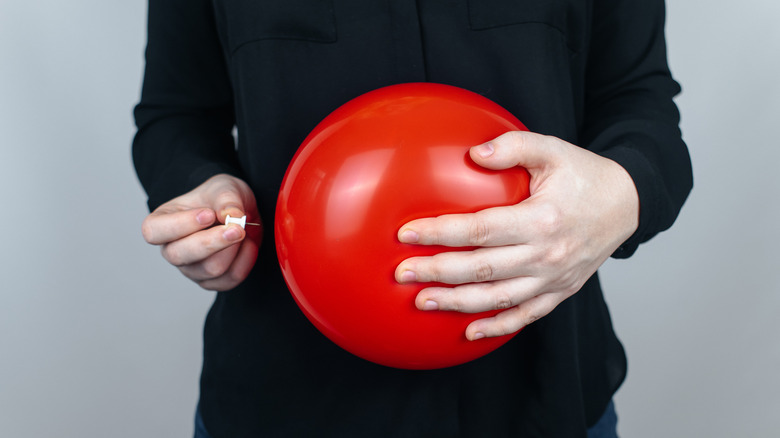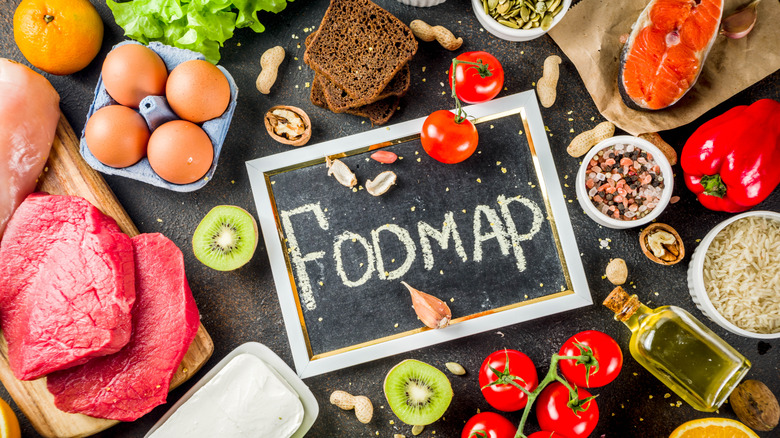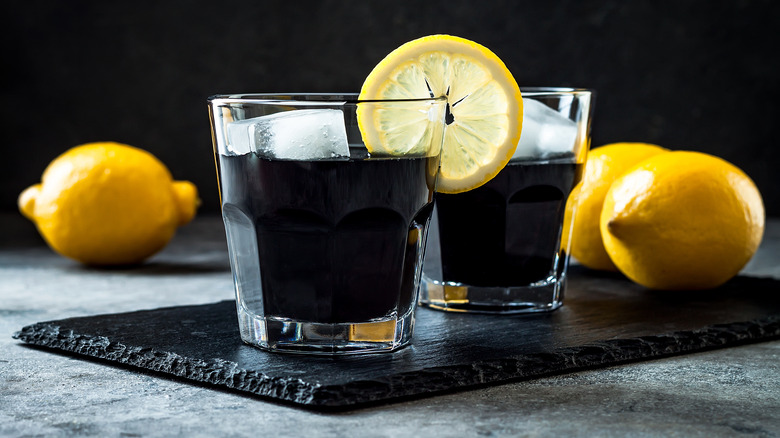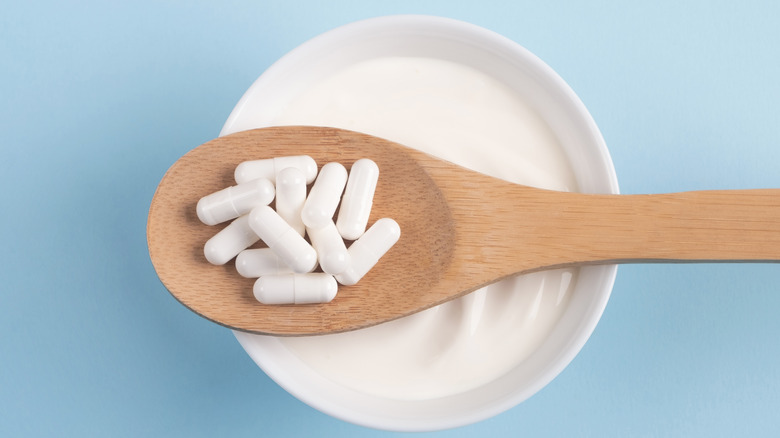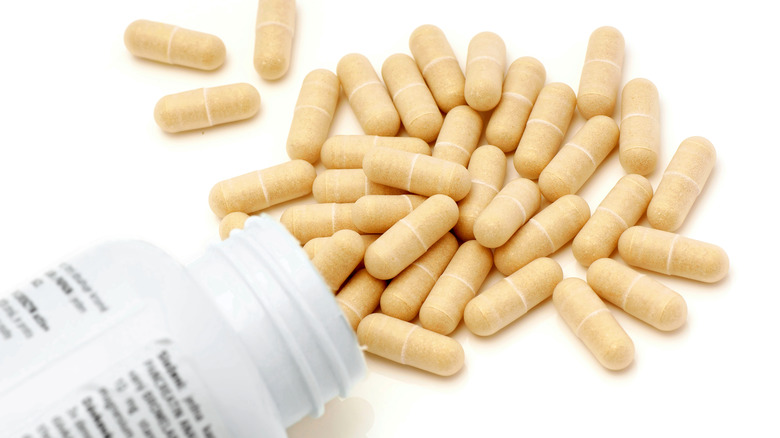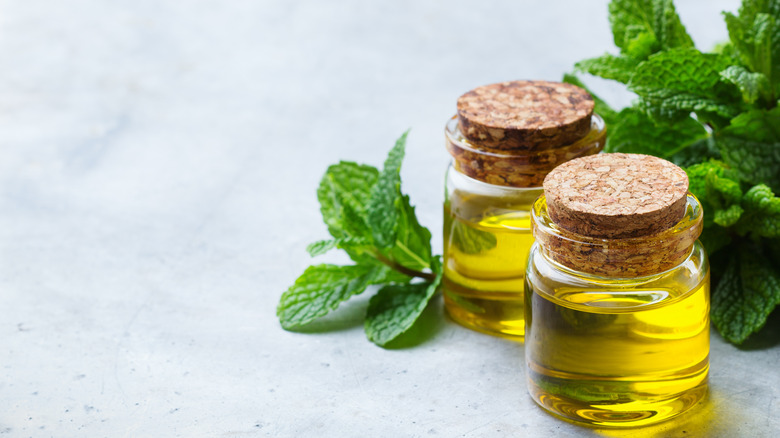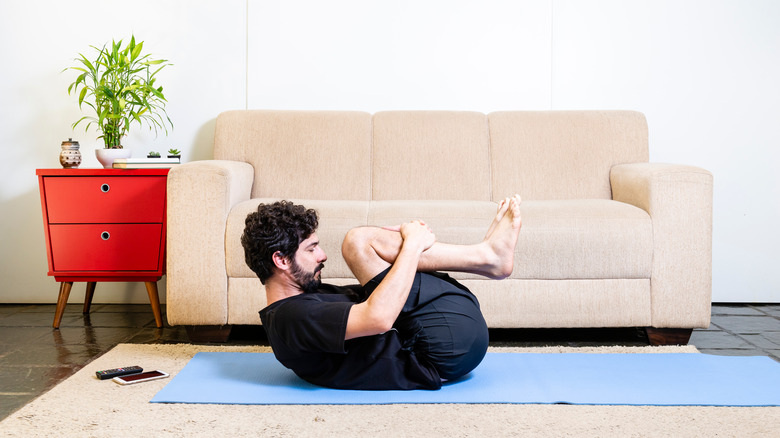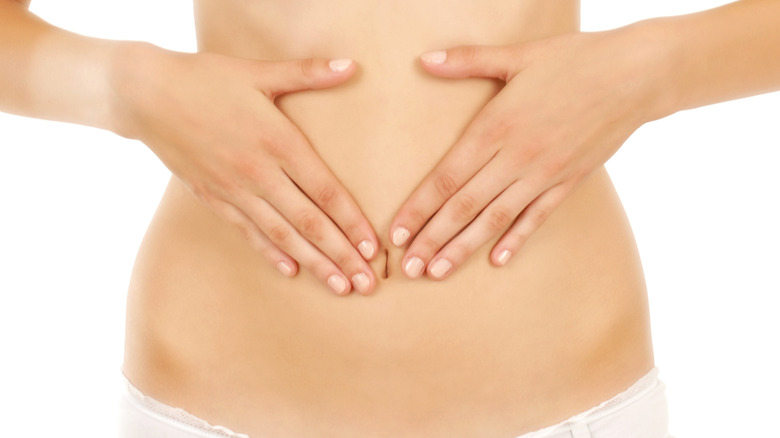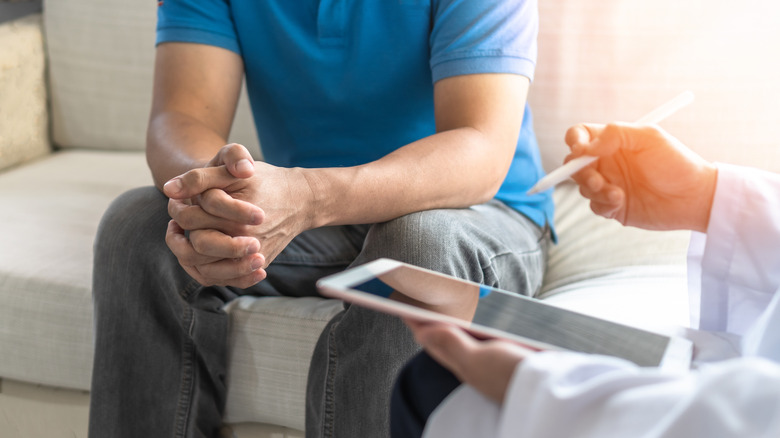Tricks To Get Rid Of Bloating That Actually Work
Although "bloated" and "bloating" can refer to literally anything that seems overfilled or overextended (via Merriam Webster), abdominal bloating, in particular, is what we're usually referring to when we complain of bloat. That's because bloating is one of the most common complaints of people experiencing any number of gut issues, according to a special report published in September 2005 edition of Gastroenterology (via Science Direct). That said, many, if not most, causes of bloating aren't particularly worrisome (via Medical News Today). One reason for this may be that as a clinical term, "bloating" is rather ambiguous and can refer to any number of uncomfortable sensations having to do with the abdomen.
For example, it can refer as much to "subjective sensation" as it does to "objective abdominal distension," according to the 2005 report. And, depending upon who is using the term, it may even refer to something as insignificant as a "rumbling" in the tummy, the feeling of needing to use the restroom, or feeling the need to pass gas. Since the statistics are in favor of your own bloating being due to something minor and treatable, we're going to offer you our best time-honored tricks to reduce bloating. Since they all really do work, let's hope that you'll find one that helps you nip your bloating in the bud. If it should happen that nothing helps, we'll tell you what you can do in that case as well.
Try an elimination diet to rule out food allergies and food intolerances
Food intolerance, food sensitivities, and food allergies are, collectively, extremely common — to the point that up to 20% of people worldwide are dealing with one or more, according to Healthline. And that means that there are a lot of people out there dealing with the common symptoms of these, which include abdominal bloating. For the purpose of identifying intolerances, sensitivities, and allergies — and providing relief as quickly as possible, "elimination diets" are considered the "gold standard." There are many forms of elimination diets, but all of them involve completely removing particular foods from your diet and observing whether your bloating and other symptoms improve (via Noom).
If you do experience an improvement following the removal of a certain food from your diet, then it may be presumed that your bloating was caused by the food you removed. At that point, your elimination diet may involve carefully controlled attempts to reintroduce that food while being on guard for another reaction, but only under the supervision of a medical professional. That being said, if you have bloating that you believe may be in connection with a food intolerance, sensitivity, or allergy, it would be best to approach all aspects of an elimination diet with the help of a medical professional (via Healthline).
Give the Low-FODMAP diet a try to reduce bloating
The term, "FODMAP" refers to "fermentable oligosaccharides, disaccharides, monosaccharides and polyols," according to Johns Hopkins Medicine. Each of these is a carbohydrate that, for most people, the small intestine has difficulty digesting as a baseline. However, for some, eating foods that are high in FODMAPs causes distinct symptoms of digestive distress including, specifically, bloating, as well as others might be described clinically as bloating (e.g. cramping, the need to pass gas). A "low FODMAP" diet is a specific type of elimination diet that is appropriate for those who have reason to suspect that their bloating and other symptoms may be the result of a FODMAP intolerance. One sign that the problem may be FODMAP intolerance is bloating that worsens over the course of the day (as more and more food is introduced into the intestines).
Going "low FODMAP" begins with eliminating all high-FODMAP foods from one's diet. High-FODMAP foods include all dairy foods, all foods containing wheat, all beans and lentils, and some fruits (including apples, cherries, peaches, and pears) and vegetables (including artichokes, asparagus, onions and garlic). After all of these are out of your system, if the problem is attributable to FODMAPs, then you should feel some relief from your symptoms. The next step would be to reintroduce, one at a time, the FODMAPs you hope to include in your diet, provided they don't cause you additional bloating, etc.
Activated charcoal might be just the trick to help reduce bloating
For many people experiencing feelings of abdominal bloating from any number of causes, taking activated charcoal supplements, whether in powder or pill form, can provide at least temporary relief (via UCLA Health). Activated charcoal, which is available over the counter at most pharmacies, is made by heating regular charcoal (the kind you would never consume in any form) until it becomes porous. Upon ingesting activated charcoal, the "spaces" between molecules that make the charcoal porous act like gas-magnets, drawing the gas inward and thus reducing the gas's presence in the intestines.
The biggest downside to activated charcoal is that it is not regulated by the U.S. Food and Drug Administration (FDA). That means that it presents the possibility of unknown consequences when taken with other foods, supplements, and/or drugs. Another downside to taking activated charcoal is that it may cause temporary tongue discoloration. Activated charcoal may also cause black stools during the time it is making its way through the intestines, and it has also been implicated in causing constipation. Like the relief to be gained from taking charcoal, these side effects are temporary. For bloating that does not respond to activated charcoal, or bloating that returns repeatedly after taking activated charcoal, a check-in with one's primary care physician would probably be a good next step.
See how you feel after taking an over-the-counter simethicone-based tablet
According to UCLA Health, some research studies have given clinicians reason to believe that the drug, simethicone, may be capable of enhancing the relief from bloating that is to be obtained from taking activated charcoal. However, taking simethicone is also considered to be an effective trick for relieving bloating, even without activated charcoal, according to My Health of Alberta, Canada.
Simethicone is an "anti-foaming" agent. According to the makers of "Gas-X" brand gas relief tablets (of which simethicone is the active ingredient), simethicone helps reduce the bloating caused by gas. It does so by connecting and breaking down the gas bubbles. Smaller, smoother gas bubbles are not only more easily tolerated by the body, and they are also more easily released — and less obviously to the outside world. To put it in simpler terms, as the manufacturer's say, "simethicone, such as Gas-X, can relieve bloating by making you burp."
That being said, if you've been taking antibiotics and are experiencing bloating, it's probably best to skip the antacids, according to Dr. Robyn Chutkan (via her website) because the blocking of stomach acid can leave you vulnerable to an overgrowth of dangerous intestinal bacteria. For bloating in connection with taking antibiotics, probiotics are a better bet for safe relief.
If you've recently taken antibiotics, then a probiotic might be right for you
Many people experience bloating from taking antibiotics. One reason is that antibiotics kill "good" intestinal bacteria along with the "bad" bacteria they were prescribed to eliminate, thus allowing gas-producing microbes to "proliferate to fill the void," according to integrative gastroenterologist, Dr. Robyn Chutkan (via her website). Dr. Chutkan noted that bloating caused by an imbalance in intestinal bacteria is referred to clinically as "dysbiosis." To avoid dysbiosis that may be caused by taking antibiotics, Dr. Chutkan recommended taking a probiotic supplement (available over the counter) during your antibiotics course and for at least one month after completing it. Probiotics are actual living organisms that can relieve dysbiosis by replenishing and enhancing the intestinal flora (via Healthline).
It's worth noting, however that while taking probiotics is safe for most people, there may be side effects and, ironically, one such side effect is bloating, according to registered dietitian Eric Julson (via Healthline). Julson ultimately concluded that if bloating, whether as a primary symptom or as a side effect of taking probiotics, continues for more than just a limited period (say, a few weeks), then it could be a good idea to consult a medical professional.
You can also try digestive enzymes to address excess bloating
The digestive process involves, among other things, breaking down food into smaller particles (via Cleveland Clinic). "Digestive enzymes" are produced by various organs in the digestive tract to assist with this process. Most are produced by the pancreas, although some are made by other organs within the digestive tract (e.g. the salivary glands, the liver, etc.).
"Digestive enzymes" are also available over the counter on the theory that, like most supplements, when you take them, you're giving whatever system they support a boost (via Healthline). If you're dealing with bloating, then theoretically, the right digestive enzyme should assist your digestive tract in digesting whatever is giving rise to the bloating. However, actual digestive enzyme deficiencies aren't common, according to the Cleveland Clinic's nutrition director, Dr. Brian Weiner (via Cleveland Clinic), and most are caused by serious disorders, including pancreatitis, pancreatic cysts and tumors, and diabetes — disorders that are far less common than the market for digestive enzymes would appear to support.
Two types of digestive enzyme have been proven clinically effective to help reduce bloating, according to Dr. Weiner. These are alpha-galactosidase, the active ingredient in "Beano," which reduces bloating caused by eating beans and cruciferous veggies. The other is lactase, the active ingredient in Lactaid, which has been proven effective in reducing bloating and other digestive symptoms associated with consuming milk-based products.
Another trick for getting rid of bloating is to eat more fiber
Just as probiotics can help get rid of bloating but can also actually CAUSE bloating in some cases, so too can adopting a high fiber diet, according to WebMD. This seeming paradox has led to some confusion over the years. However, a 2020 study out of Johns Hopkins University Bloomberg School of Public Health, published in the journal, Clinical and Translational Gastroenterology, may have provide welcome clarity. That study demonstrated that people who eat high fiber diets are less likely to experience bloating if they focus more on eating carbohydrates than proteins (via Science Direct). Specifically, for that study, 164 people with high blood pressure were fed a "heart-healthy, (plant-based) high-fiber diet." For part of the time, the diet was rich in protein while, for part of the time, it was rich in carbohydrates. During the protein-rich portion, the participants were 40% more likely to report bloating.
"It's possible ... the protein-rich version of the diet (which delivered protein primarily from beans, legumes, and nuts) caused more bloating because it caused more of a healthy shift in the composition of the microbiome," noted study co-senior author Noel Mueller, PhD (via Science Direct). Accordingly, the results may also suggest that your choice of macronutrients (in this case, carbs versus proteins) may not only impact how bloated you feel but the overall health and composition of your intestinal microbiome. However, more research will be needed before we know for sure.
Taking peppermint oil may help get rid of bloating
Another cause of bloating may be "altered function of the muscles in the digestive tract," according to Healthline. Or, to put it another way, bloating can be caused by overactivity of the smooth muscle that lines the digestive tract. That is what is believed to be at the heart of "irritable bowel syndrome," or "IBS," according to Medical News Today, which pointed out that "IBS affects how the brain and gut work together, and the condition may cause the muscles in the gut to contract more than they need to for a normal bowel movement."
Whether or not you have a diagnosis of IBS (which is a "diagnosis of exclusion," meaning that it's what's left after doctors rule everything else out), you might suspect that your bloating is the result of too much muscular activity in the gut. If so, then taking an antispasmodic may help do the trick in getting rid of that bloating (via Healthline). Peppermint oil is a proven antispasmodic (via 2008 study published in the journal, BMJ), and various studies have shown that it can reduce bloating and related symptoms in patients with IBS, including this one from 2014 that was published in the Journal of Clinical Gastroenterology.
Eating more slowly could help reduce bloating
If you can't think of any other reason that you might be bloated, you might want to ask yourself if it's possible you've been eating too quickly, according to registered dietitian Marisa Moore (via Self). First, if you're eating too quickly, you may not have time to fully chew your food before swallowing. Not chewing your food thoroughly may cause bloating because larger pieces of food take longer, more effort, and more digestive enzymes in order to break down over the course of the intestinal tract, according to registered dietitian Brigitte Zeitlin (via Self). All of this can lead to increased gas in the digestive system. Similarly, talking while you eat can introduce gasses into your stomach that may cause bloating (via Medical News Today). So can drinking soda with meals (via Healthline).
Yet another reason that eating too quickly might cause bloating is that your stomach may not have had adequate time to convey to your brain that you're feeling full (which takes about 20 minutes, according to Moore), and you continue eating, your bloating may be the result of literal stomach distension (from too much food).
That sugar-free gum could be making your bloating worse
Did you know that chewing sugar-free gum can cause bloating and other forms of intestinal distress? It's true, according to registered dietitian Alicia Romano, of the Frances Stern Nutrition Center at the Tufts University Medical Center (via the Tufts University Nutrition Letter). It's not uncommon to experience gas and bloating when chewing sugar-free gum, Romano wrote. "We naturally swallow a lot of air while chewing gum — sugar-free or not. Extra air swallowed can mean extra gas. But the main reason for bloating when you chew sugarless gum is the presence of sweeteners called sugar alcohols."
Sugar alcohols are a type of carbohydrate with the distinction of being slowly and incompletely absorbed by the body. You'll see them listed in the ingredients label on sugar-free gum packages as xylitol, mannitol, sorbitol, maltitol and/or erythritol. As Romano pointed out, "Fermentation and incomplete digestion of these sweeteners in the large intestine (colon) lead to gas, bloating, cramping, and diarrhea."
Although everyone's tolerance level is unique, bloating tends to occur when you chew a lot of sugar-free gum at one time. It's probably also worth pointing out here that sugar alcohols are considered to be in the category of FODMAPs, according to Healthline. And consumption of FODMAPs is yet another known cause of bloating (via Johns Hopkins Medicine).
Walking could help reduce your bloating
One way to ease bloating discomfort is to get moving, according to Everyday Health. Even if you're inclined to sleep off a big meal, a 10- to 15-minute walk can mean the difference between feeling bloated and not feeling bloated. While any activity is good for getting things "moving," the most tried-and-true activity for this purpose is simply putting one foot in front of the other and walking. Physical activity can get the bowels moving more regularly, which can help to release excess gas, thereby alleviating the feeling of bloating, according to Medical News Today. In fact, even a quick walk around the block could offer immediate relief from bloating and related gas pressure.
In addition, taking a walk can help to get the bowels moving, especially if you've been feeling constipated, which is yet another cause of bloating. To the extent that walking can help get your bowels moving — to the point where you would actually feel inclined to seek out the bathroom — then walking may be one of the easiest tricks yet when it comes to getting rid of bloating.
Certain yoga poses can help you with bloating, for real
Physical activity can help reduce feelings of bloating, and that includes walking, even for short distances (via Everyday Health). You know what other physical activity has been known to banish bloating? Yoga. In fact, certain yoga poses were actually designed with intestinal health and well-being in mind, according to Healthline. These include the one pictured, in which you draw your knees into your chest, and wrap your arms around your shins. Staying there while slowly breathing in and out has actually been known to help people to pass gas. That is why it is sometimes referred to as "wind-removing pose." The gentle pressure your legs place on your abdomen and that your arms place on your legs can also help to stimulate gut activity, which can help reduce feelings of bloating. Try it, yourself, and there's a good chance you'll understand what we're talking about.
Another yoga pose that may help to relieve bloating is "child's pose," which is, essentially, the same pose but turned upside down. In other words, to do child's pose, you kneel on the ground with the backs of your thighs pressing on top of your calves, and then you lower your abdomen onto the fronts of your thighs, and stay there and breathe slowly. Here are more exercises you can try for alleviating bloating.
Abdominal massage is a neat, low-tech trick that can help reduce bloating
"Massaging your stomach can help to move stool along the inside of your colon," which can "relieve symptoms of tightness, pressure, cramping and bloating," according to The University of Michigan's Bowel Control Program. One of the reasons that the yoga poses, wind-removing pose and child's pose, can help relieve bloating is that in both poses, you are using the weight of your own body, plus gravity, to passively massage your abdomen. Michigan's Bowel Control Program offers a simple tutorial on how to use your hands to massage your abdomen to reduce bloating and abdominal discomfort. In pertinent part, it instructs:
Starting on the right side of your stomach down by where your hipbone rises to a crest, rub with your fingertips using a circular motion, "lightly up to the right side" until you reach your ribcage. At that point, move your hands straight across to the left side of your abdomen and work your way down to the hipbone on your left side. The whole process should take two to three minutes. Repeat the process, digging a bit more deeply with your fingers. According to Michigan's Bowel Control Program, 10 minutes of this form of massage is ideal for helping get rid of bloating.
Here is what to do if none of these tricks provide relief
Bloating is such a common condition and is so often caused by benign origins that we're guessing you're going to find some relief from one of these tricks we've been talking about (via Healthline). If not, it could be worth checking in with your primary care provider, particularly if your bloating is interfering with your comfort and your everyday activities. In addition, even if your bloating responds to one of these tricks but nevertheless reoccurs regularly, then it could also be worth checking in with your provider. Chronic bloating and/or bloating that does not respond to non-invasive treatments such as those discussed here could indicate a more serious issue.
Some of the more serious conditions that may cause bloating include celiac disease, Crohn's disease, ulcerative colitis, parasitic infection, various cancers such as ovarian and colon, and various diseases and conditions involving the liver, the pancreas, or any other organ that is part of the digestive tract (via Everyday Health). As we have stated before, none if these are common reasons for bloating, and many are treatable under a medical professional's oversight.

